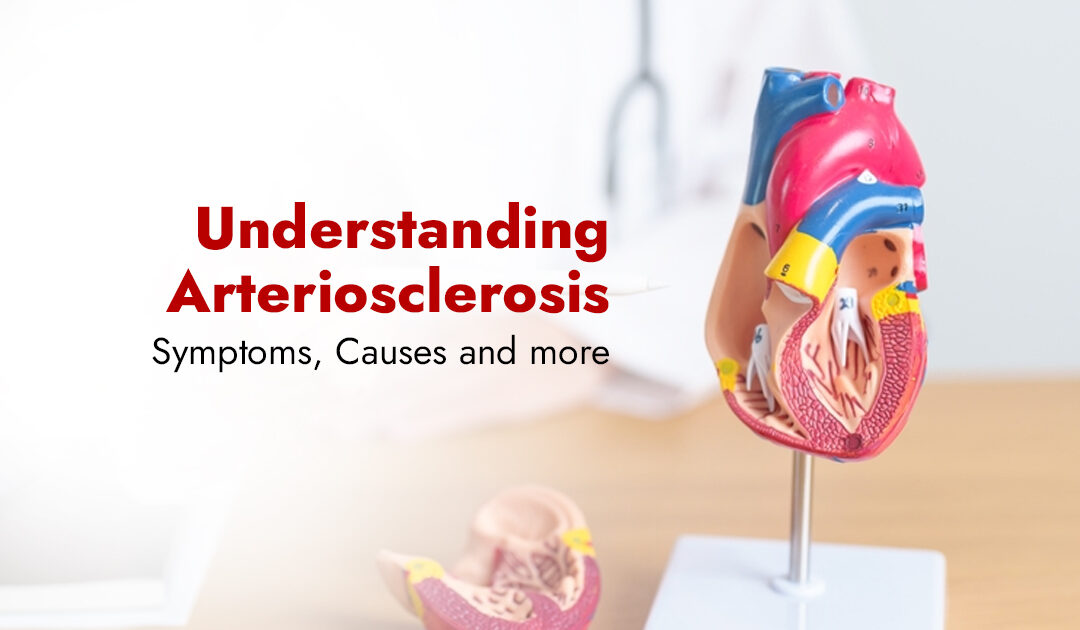Arteriosclerosis is a medical word used to describe artery hardening. Arteriosclerosis causes usually flexible arterial walls to harden or stiffen.
Your arteries are the blood vessels that carry oxygenated blood from your heart to all of your organs and tissues. Arterial hardening can obstruct blood flow and impair the normal functioning of the circulatory system.
Arteriosclerosis is a long-term, quiet process. Arteriosclerosis increases the risk of a variety of cardiovascular illnesses. You may not notice any symptoms for a long period before your arteries harden and cause problems. It is possible to have more than one form of arteriosclerosis, and their combined effects can cause issues to arise sooner than expected.
What are the signs and symptoms of Arteriosclerosis?
Symptoms of arteriosclerosis are typically not present until difficulties arise. Symptoms vary greatly depending on the situation and may include:
- Burning or aching pain in your feet.
- Changes in how often you pee.
- Chest pain or discomfort.
- Dizziness.
- Dry, itchy or numb skin.
- Fatigue.
- Heart palpitations.
- Leg pain.
- Nausea or vomiting.
- Shortness of breath.
- Slurred speech or trouble communicating.
- Sores on your feet.
- Swelling.
- Vision loss in one eye.
- Weakness on one side of your body.
What are the causes of arteriosclerosis?
Arteriosclerosis is the result of changes to your arterial wall. These alterations begin microscopically and occur at the cell level. These types of changes are common as you become older. There is nothing you can do to reduce the risks associated with aging. That is why it is critical to understand other risk factors that you may be able to control, such as lifestyle modifications.
Risk Factors for Arteriosclerosis
The following factors contribute to arterial hardening:
- Chronic kidney disease.
- High blood pressure.
- High cholesterol.
- Increasing age.
- Lack of physical activity.
- Metabolic syndrome.
- Tobacco use.
- Type 2 diabetes.
Can Arteriosclerosis be prevented?
Your arteries cannot always be prevented from hardening. However, you can reduce the risk by:
- Avoiding all forms of tobacco use, including smoking, vaping, and chewing.
- Consuming a heart-healthy diet like the Mediterranean Diet.
- Exercising for at least 30 minutes a day, five days a week.
- Maintaining a healthy weight.
- Treating underlying medical issues.
What is the impact of arteriosclerosis?
Arteriosclerosis interrupts the regular flow of blood in your body. When your arteries get overly stiff, it is more difficult for oxygen and nutrients to reach your organs and tissues. As a result, arterial hardening can cause difficulties such as:
- Aneurysms.
- Carotid artery disease.
- Coronary artery disease.
- Critical limb ischemia.
- Heart attack.
- Kidney failure.
- Mesenteric ischemia.
- Peripheral artery disease.
- Pulmonary embolism.
- Renal artery stenosis.
- Stroke.
- Thrombosis.
- Transient ischemic attack.
How is Arteriosclerosis detected?
This disorder is diagnosed by healthcare providers using:
- Conducting a physical examination.
- Asking questions about your biological family history, lifestyle and symptoms.
- Ordering tests.
What are the treatments for arteriosclerosis?
Treatments for arteriosclerosis include:
- Changes in lifestyle (for example, exercise, a healthier diet, or stopping smoking).
- Medications.
- Procedures or surgeries.
Arteriosclerosis, often known as arterial hardening, is a degenerative condition that slowly inhibits blood flow throughout the body. While symptoms may not occur for years, the consequences might be severe, such as a heart attack, stroke, or kidney failure.
Despite all this, there is some good news. You have some influence over the risk. Adopting a heart-healthy lifestyle, such as stopping smoking, eating a balanced diet, and exercising regularly, can dramatically reduce your risk of developing this condition. If you have any concerns, talk to your doctor. Early detection and management are critical for living a long and healthy life.

